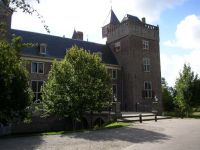Heemskerk (Dutch pronunciation: [ˈɦeːmskɛrk] (listen)) is a municipality and a town in the Netherlands, in the province of North Holland. It is located in the Kennemerland region.
History
It is not certain where the name of Heemskerk comes from. The town was already known during the Middle Ages. In an official deed from the year of 1063, the town was known as Hemezen Kyrica, Latinized Frisian meaning Church of Hemezen, a Frisian nun who lived in a religious house there. Heemskerk knows many historical monuments, among them the Huldtoneel (lit. the "Inaugurate Stage"), an artificial hill located near the current Rijksstraatweg, where once the Counts of Holland were inaugurated. According to tradition, the Huldtoneel was used before the Roman Era as a Germanic sanctuary. In the nineteenth century Jonkheer Gevers finally made the Huldtoneel a monument - as it is known today - and ordered passers-by to honour the monument.
Many battles have been fought in Heemskerk. Two castles - Castle Oud Haerlem and Castle Heemskerk - were built in the twelfth and thirteenth century respectively to protect the County of Holland against the West Frisians. In the fifteenth century the residents of Heemskerk fought each other during the Hook and Cod wars, in which both castles were destroyed. The Oud Haerlem castle was never rebuilt, Castle Heemskerk however was. In 1492 a rebellion by the people of Kennemerland was brutally beaten down by the Austrian conquerors, on the place where today the cemetery of the Hervormde Kerk (Reformed Church) is located.
In 1610 the Castle Heemskerk was renamed to Castle Marquette and was at first the residence for many nobles and later inhabited by patricians. The last noble family that lived there were the House of Gevers. Today Castle Marquette is owned by the Spanish hotelgroup NH Hoteles and is the site of many weddings, conferences, and company courses, while the estate grounds are favoured for wedding photos.
Located on the eastside of Heemskerk
